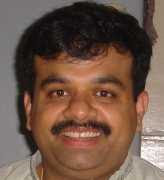"There are more than than one hundred different types of atoms, from lightweights like hydrogen and helium through welterweights like tin and iodine and out to such mumbling mooseheads as ununpentium and ununquadium, but they're all much the same nearly nil size. You can fit more than three atoms in a nanometer, meaning it would take 10 to the 13th power, or ten trillion of them, to coat the disk of our pinhead. And the funny thing about an atom is that its outlandish smallness is still too big for it: almost all of its subnanometer span is taken up by empty space. The real meat of an atom is its core, its nucleus, which accounts for about 99.9 percent of an atom's matter. When you step on your bathroom scale, you are essentially weighing the sum of your atomic nuclei. If you could strip them all from your body, go on a total denuclear diet, you'd be down to about twenty grams, the weight of four nickels, or roughly the weight of the doornail that you would be as dead as.
"Those remaining twenty grams belong to your electrons, the fundamental particles that orbit an atom's nucleus. An electron has less than 1/1,800 the mass of a simple atomic nucleus. ... Viewed from the more impressive angle of volumetrics, we see that, while the nucleus may make up nearly all of an atom's mass, ... it takes up only a trillionth of its volume.
"Here it is worth a final reversion to metaphor. If the nucleus of an atom were a basketball located at the center of Earth, the electrons would be cherry pits whizzing about in the outermost layer of Earth's atmosphere. Between our nuclear [basketball] and the whizzing pits, there would be no Earth: no iron, nickel, magma, soil, sea, or sky, ... nothing, literally, to speak of. ... We live in a universe that is largely devoid of matter. Yet still the Milky Way glows, and still our hemoglobin flows, and when we hug our friends, our fingers don't sink into the vacuum with which all atoms are filled. If in touching their skin we are touching the void, why does it feel so complete?"
Natalie Angier, The Canon, Houghton Mifflin, 2007, pp. 85-86.
From Delanceyplace.com
"Those remaining twenty grams belong to your electrons, the fundamental particles that orbit an atom's nucleus. An electron has less than 1/1,800 the mass of a simple atomic nucleus. ... Viewed from the more impressive angle of volumetrics, we see that, while the nucleus may make up nearly all of an atom's mass, ... it takes up only a trillionth of its volume.
"Here it is worth a final reversion to metaphor. If the nucleus of an atom were a basketball located at the center of Earth, the electrons would be cherry pits whizzing about in the outermost layer of Earth's atmosphere. Between our nuclear [basketball] and the whizzing pits, there would be no Earth: no iron, nickel, magma, soil, sea, or sky, ... nothing, literally, to speak of. ... We live in a universe that is largely devoid of matter. Yet still the Milky Way glows, and still our hemoglobin flows, and when we hug our friends, our fingers don't sink into the vacuum with which all atoms are filled. If in touching their skin we are touching the void, why does it feel so complete?"
Natalie Angier, The Canon, Houghton Mifflin, 2007, pp. 85-86.
From Delanceyplace.com




No comments:
Post a Comment